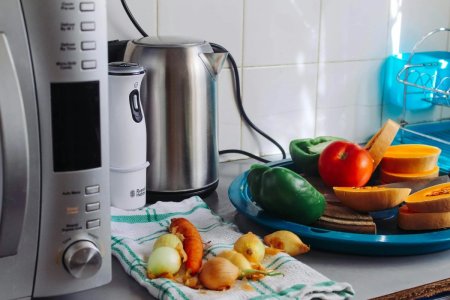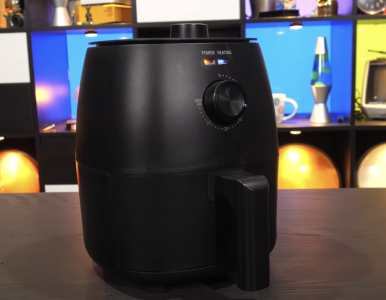Are you damaging your health? Experts reveal surprising risks for frequent users of this kitchen appliance
By
Veronica E.
- Replies 0
A certain kitchen appliance have taken the kitchen by storm, promising crispy, golden perfection with little to no oil.
They’ve quickly become a favorite for those looking to enjoy fried foods with fewer calories and less guilt.
But could this popular appliance have hidden risks?
Some recent findings suggest that how you use and maintain your air fryer could impact more than just the taste of your food.
Experts are now shedding light on potential health concerns that every air fryer user should be aware of—especially if you use yours frequently.
From cleaning habits to potential chemical exposure, there are important factors to consider to ensure your air fryer remains a safe and healthy cooking tool.

While air fryers can be a fantastic tool for making healthier versions of your favorite crispy dishes, they do have their limits.
Unlike traditional ovens, they rely on rapid air circulation, which means cooking larger items—like a whole chicken—can lead to uneven cooking.
And not all foods are suited for an air fryer’s high-speed gusts of heat; items like pasta, rice, and certain fresh greens won’t cook properly and could even create a mess inside the appliance.
Beyond their cooking limitations, there’s a more pressing concern—how improper use and lack of maintenance could impact your health.
Dr. Richard Anderson, head of learning and development at High Speed Training, stresses the importance of regular cleaning: "It’s recommended that you give your air fryer a light clean after every use and a deeper clean every month, or every few uses if you regularly cook greasy foods."
Many air fryer users assume tossing the removable parts into the dishwasher is the easiest way to clean up—but this could be doing more harm than good.
The high heat and detergent in dishwashers can wear down the non-stick coating, potentially affecting both your appliance’s performance and your health.
If you’re dealing with tough grease, Anderson suggests a gentler approach: "Try filling the tray or drawer with water, add a dishwasher tablet, and leave to soak overnight. Rinse clean the next day."

Perhaps the most concerning issue is the potential for chemical exposure.
Like many non-stick cookware items, air fryers contain polyfluoroalkyl substances (PFAS)—chemicals that are known for their persistence in the environment and the human body.
The American Cancer Society warns that PFAS don’t break down easily, and some studies suggest they may be linked to certain health risks.
While the risk is low unless your air fryer is damaged or showing signs of peeling, it’s a good idea to inspect your appliance regularly and replace it if necessary.
To keep your air fryer functioning safely, consider these simple steps:
Air fryers can be a great addition to your kitchen, offering a convenient way to enjoy crispy foods with less oil. However, taking a few precautions—like proper cleaning and checking for wear and tear—can help you use yours safely and confidently.
Read next: Must-have deal: Top cordless vacuum at an unbelievable price!

At The GrayVine, we’re here to help you stay informed about the things that matter to your health and well-being. Have you had any issues with your air fryer? Do you have a cleaning tip that works wonders? Join the conversation in the comments below—we’d love to hear from you!
They’ve quickly become a favorite for those looking to enjoy fried foods with fewer calories and less guilt.
But could this popular appliance have hidden risks?
Some recent findings suggest that how you use and maintain your air fryer could impact more than just the taste of your food.
Experts are now shedding light on potential health concerns that every air fryer user should be aware of—especially if you use yours frequently.
From cleaning habits to potential chemical exposure, there are important factors to consider to ensure your air fryer remains a safe and healthy cooking tool.

Air fryers are one of the most beloved kitchen appliances—but are there hidden risks you should know about? Image Source: Pexels / Phenyo Deluxe.
Understanding the air fryer's limitations
While air fryers can be a fantastic tool for making healthier versions of your favorite crispy dishes, they do have their limits.
Unlike traditional ovens, they rely on rapid air circulation, which means cooking larger items—like a whole chicken—can lead to uneven cooking.
And not all foods are suited for an air fryer’s high-speed gusts of heat; items like pasta, rice, and certain fresh greens won’t cook properly and could even create a mess inside the appliance.
The perils of improper use
Beyond their cooking limitations, there’s a more pressing concern—how improper use and lack of maintenance could impact your health.
Dr. Richard Anderson, head of learning and development at High Speed Training, stresses the importance of regular cleaning: "It’s recommended that you give your air fryer a light clean after every use and a deeper clean every month, or every few uses if you regularly cook greasy foods."
Also read: Transform your meals in 2025: 22 air fryer recipes you can’t afford to miss!
The deep clean dilemma
Many air fryer users assume tossing the removable parts into the dishwasher is the easiest way to clean up—but this could be doing more harm than good.
The high heat and detergent in dishwashers can wear down the non-stick coating, potentially affecting both your appliance’s performance and your health.
If you’re dealing with tough grease, Anderson suggests a gentler approach: "Try filling the tray or drawer with water, add a dishwasher tablet, and leave to soak overnight. Rinse clean the next day."

Beloved for their crispy results with less oil, air fryers have earned a spot in many kitchens—but proper use and maintenance are key. Image Source: YouTube /
Technology Connections.
Technology Connections.
Also read: Master the Air Fryer with This Ultimate Beginner's Guide!
The hidden chemical concern
Perhaps the most concerning issue is the potential for chemical exposure.
Like many non-stick cookware items, air fryers contain polyfluoroalkyl substances (PFAS)—chemicals that are known for their persistence in the environment and the human body.
The American Cancer Society warns that PFAS don’t break down easily, and some studies suggest they may be linked to certain health risks.
While the risk is low unless your air fryer is damaged or showing signs of peeling, it’s a good idea to inspect your appliance regularly and replace it if necessary.
Also read: Slash your electric bill! Discover the surprisingly affordable alternative to a well-loved kitchen appliance experts swear by
Protecting your health and your air fryer
To keep your air fryer functioning safely, consider these simple steps:
- Know your appliance – Learn what foods work best and which ones to avoid.
- Clean regularly – Follow a consistent cleaning schedule to prevent buildup.
- Hand wash only – Avoid the dishwasher to protect the non-stick surface.
- Check for damage – Inspect for scratches or peeling that could expose you to chemicals.
- Stay informed – Keep up with research on PFAS and other cookware-related concerns.
Air fryers can be a great addition to your kitchen, offering a convenient way to enjoy crispy foods with less oil. However, taking a few precautions—like proper cleaning and checking for wear and tear—can help you use yours safely and confidently.
Read next: Must-have deal: Top cordless vacuum at an unbelievable price!
Key Takeaways
- Experts warn that air fryers should not be used to cook certain items, such as whole chickens, pasta, rice, and fresh greens, due to space limitations, improper cooking methods, and potential mess.
- Dr. Richard Anderson recommends giving air fryers a light clean after every use and a deeper clean monthly, or more frequently if cooking greasy foods.
- Dishwashers may damage the non-stick coating on air fryer components. For tough grease, soaking the tray or drawer in water with a dishwasher tablet overnight is suggested.
- Air fryers contain polyfluoroalkyl substances (PFAS), which have been linked to health risks. However, these should not be a concern unless the appliance is damaged or the lining is ingested.
At The GrayVine, we’re here to help you stay informed about the things that matter to your health and well-being. Have you had any issues with your air fryer? Do you have a cleaning tip that works wonders? Join the conversation in the comments below—we’d love to hear from you!






